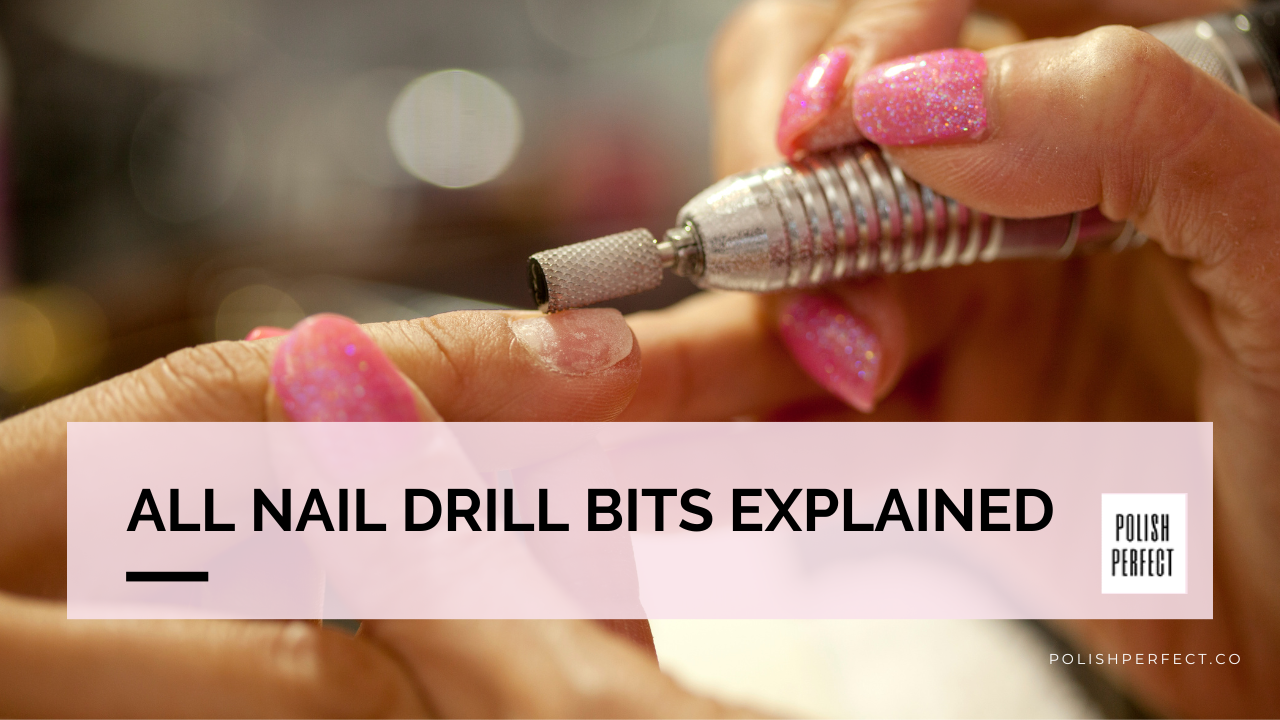Don’t fret – we’ve got your nail drill bit needs covered!
In this article, we’ll simplify the choices for beginners and pros, from natural nails to glamorous acrylics.
Let’s jump in!
Let’s Drill Down: Different Nail Drill Bits
One of the most frequently asked questions from beginners is about the types of nail drill bits.
These bits come in different shapes, sizes, materials, and grits, each specifically designed for a unique purpose.
High-quality nail drill bits do more than just shave off layers of nails. They make your job easier and help you work efficiently, saving you ample time.
Here’s a rundown of various nail bits and their uses.
Natural Nail Bit
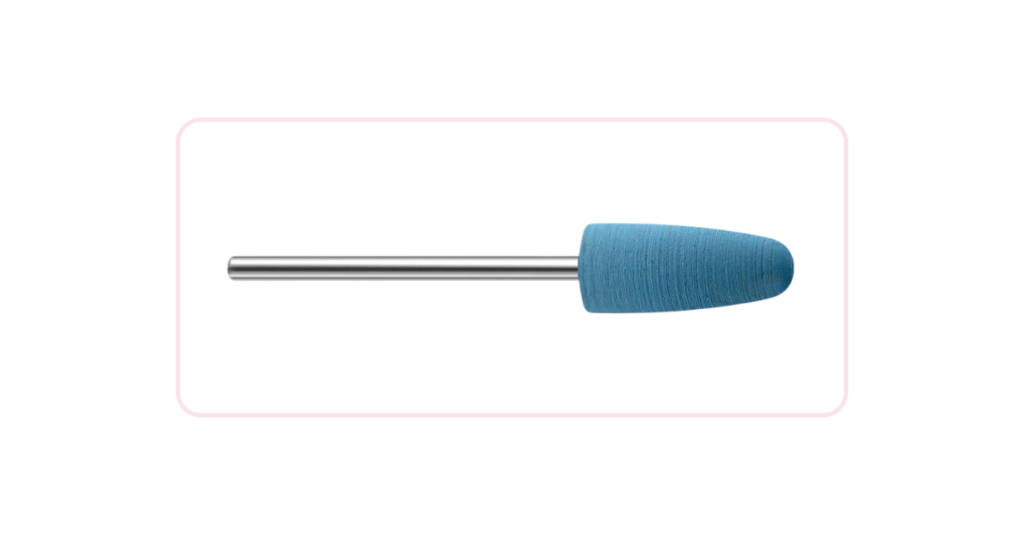
Suppose your client arrives with clean, natural nails—no acrylic in sight. In this scenario, your go-to should be a natural nail bit.
This bit is used to help you prepare the nails. Its purpose is to help take the shine off of the nail, to remove the dead cuticle, and to smooth the cuticle area.
It is made from a synthetic rubberized soft bit.
Prepper Bit
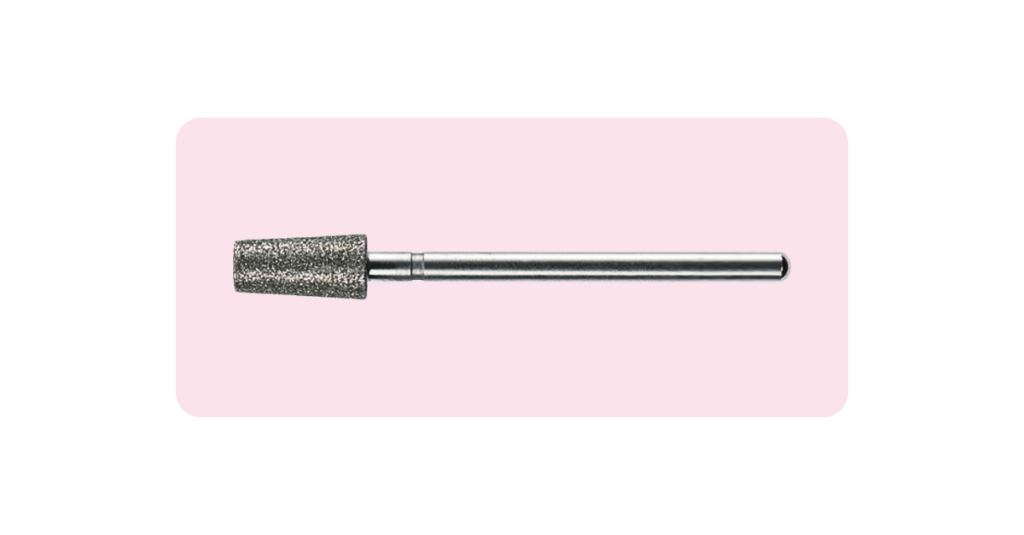
A slim piece that is tapered with a flat top, this nail bit can also be used on the natural nail. Just as the name suggests, it is used to prep the nail and smooth the edges.
Mandrel Bit and Sanding Bands
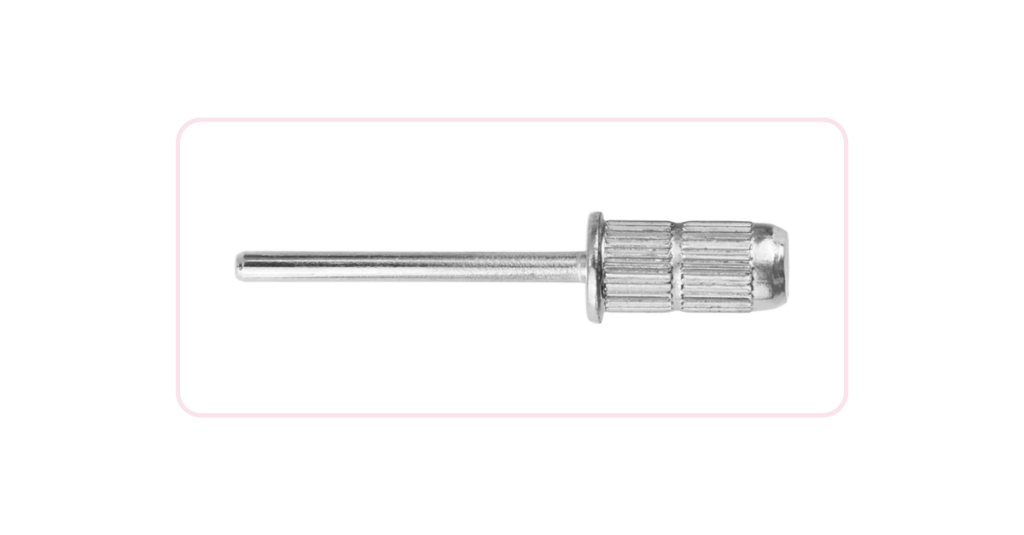
Next, when working with acrylic nails, you’ll need sanding bands that fit over the mandrel bit.
For hygiene purposes, remember to use a new band for each client as these bands can’t be cleaned or disinfected.
These bands help smooth down acrylic nails or even remove them. They come in fine, medium, and coarse grits.
Fine sanding bands remove the acrylic more slowly but yield a smoother result. Coarse bands file the nail quicker but leave a rougher finish.
The medium grit offers a balance between the two.
Small and Large Barrel
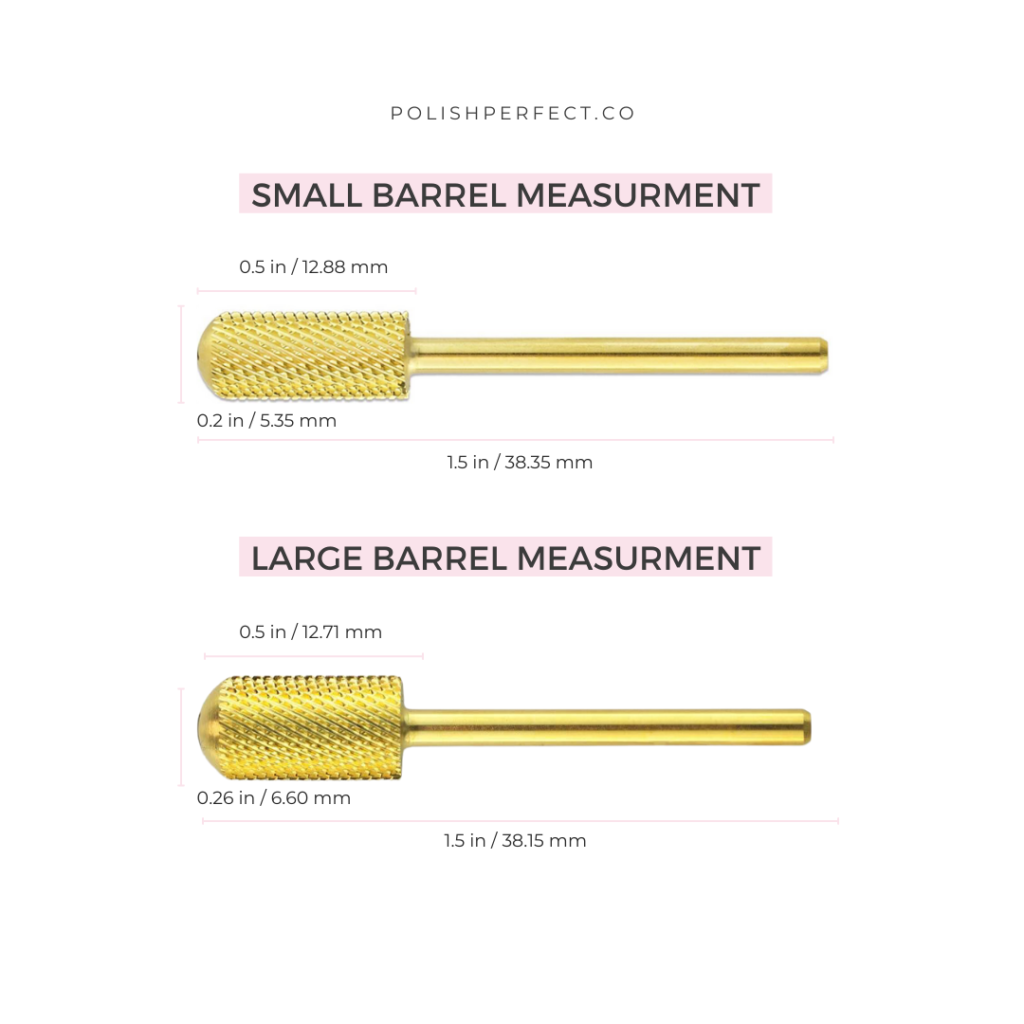
These bits are used for surface work, shortening of the nails, and also for backfill cutting.
Pedicure Bit
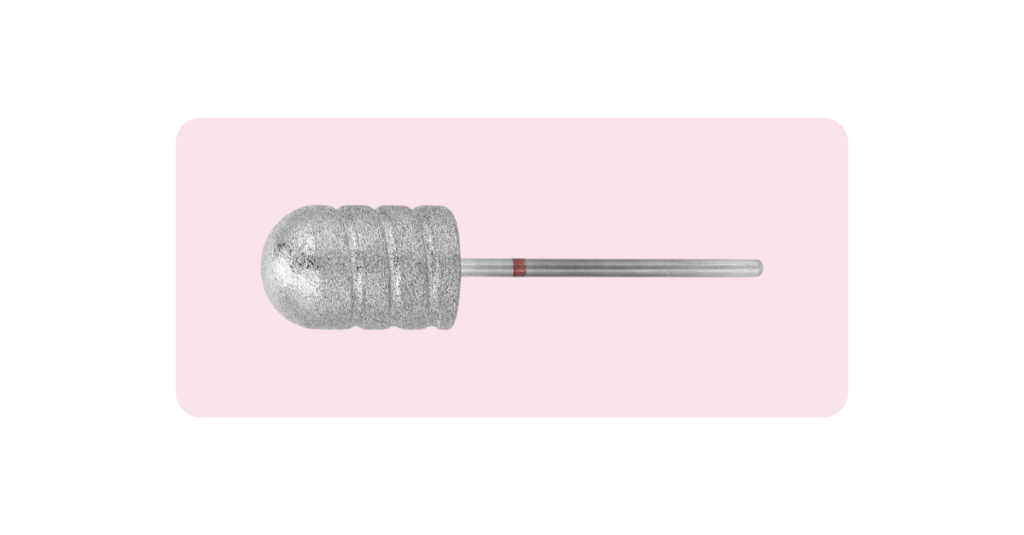
A pedicure bit has the distinct purpose of removing any callus on the feet. It is a larger bit, cone-shaped, and has strips of diamond material for cooling.
This coating material on the top cylinder also makes it easier to get to difficult spots on the toenail.
Safety Bit
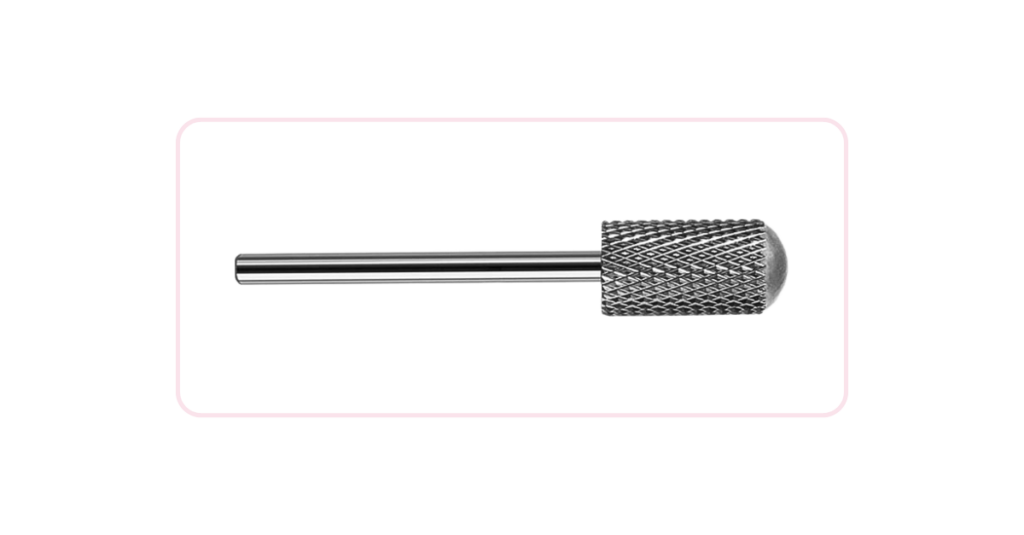
Similar to the regular carbide nail bit, the end is not square; it is rounded to help eliminate injuring a nail.
The small head allows the technician to get into the groove walls as well as the cuticle of the natural nail.
This bit helps to prepare the artificial nail so that it will fit precisely over the natural nail.
Backfill
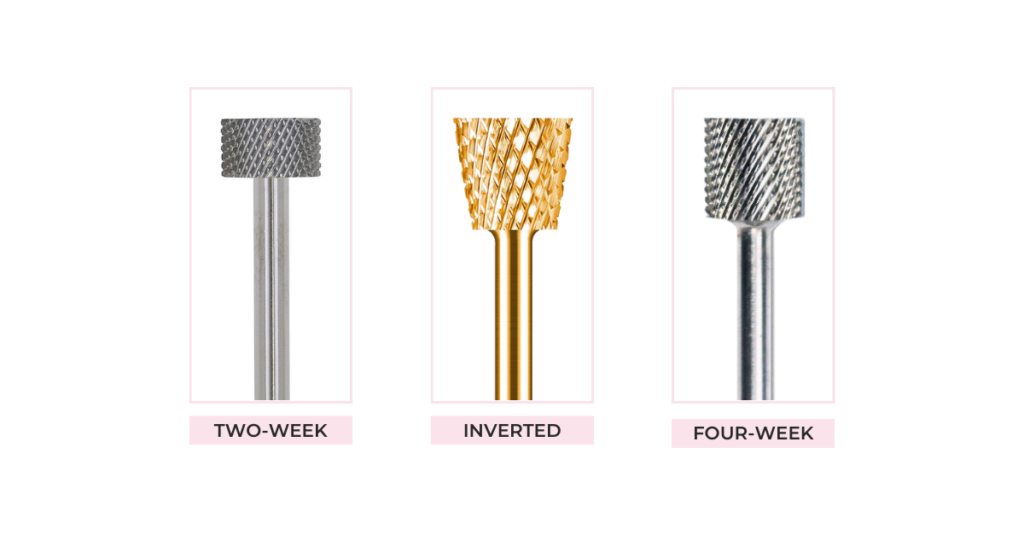
Also known as maintenance bits, there are three types to choose from: the two-week, the four-week, and the inverted backfill.
The two-week bit, 1/4 of the standard drill bit size, will remove approximately two weeks’ worth of growth, while the four-week bit, 1/2 of the standard bit size, will remove four weeks’ worth of growth.
The inverted drill bit is angled so that it is larger on top and is used when the nail technician wants to cut and remove all of the product on the tip.
Flame Bits
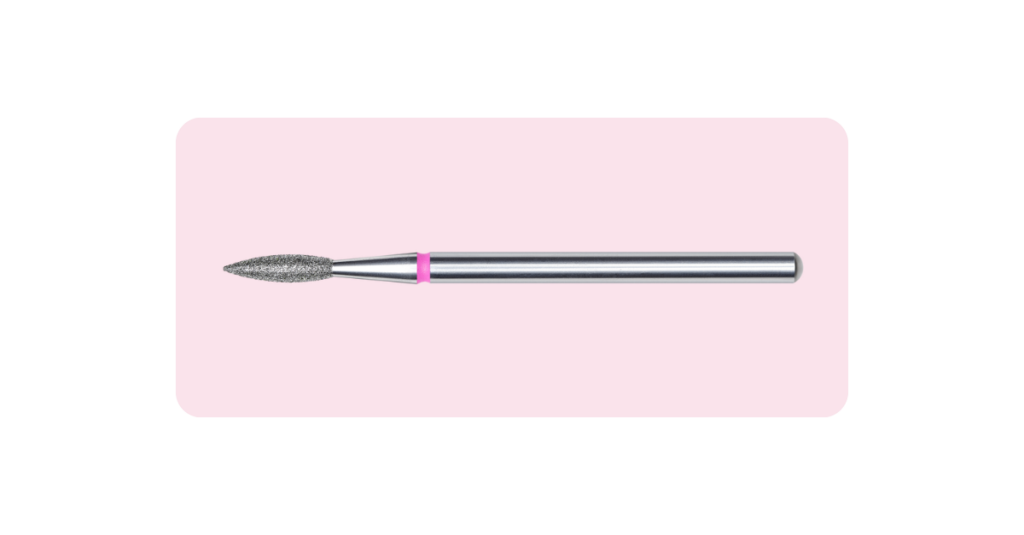
Say farewell to hangnails with this bit.
The flame bit is excellent for creating a lip of a dead cuticle, making it easier to remove. It also helps to remove any excess dust and skin around the nail plate.
5-in-1 bit (Fine, Medium, Coarse)
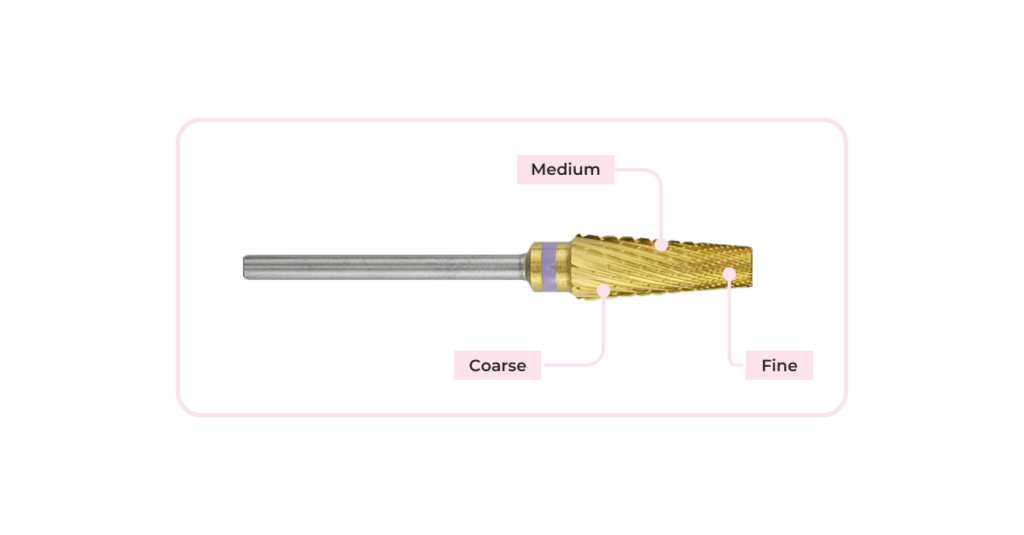
The 5-in-1 nail drill bit simplifies your job. Its versatile nature means you can use it for cleaning, prepping, forming, shortening, cuticle work, under the nail, and backfills without having to change bits.
It’s durable and designed to tackle any job you throw at it. To learn more here about the 5-in-1 nail drill bit.
Drill Bit Coatings: Types and Uses
Nail drill bits come with a variety of coatings, each catering to a specific purpose. Let’s explore some common types:
Titanium Nail Drill Bits
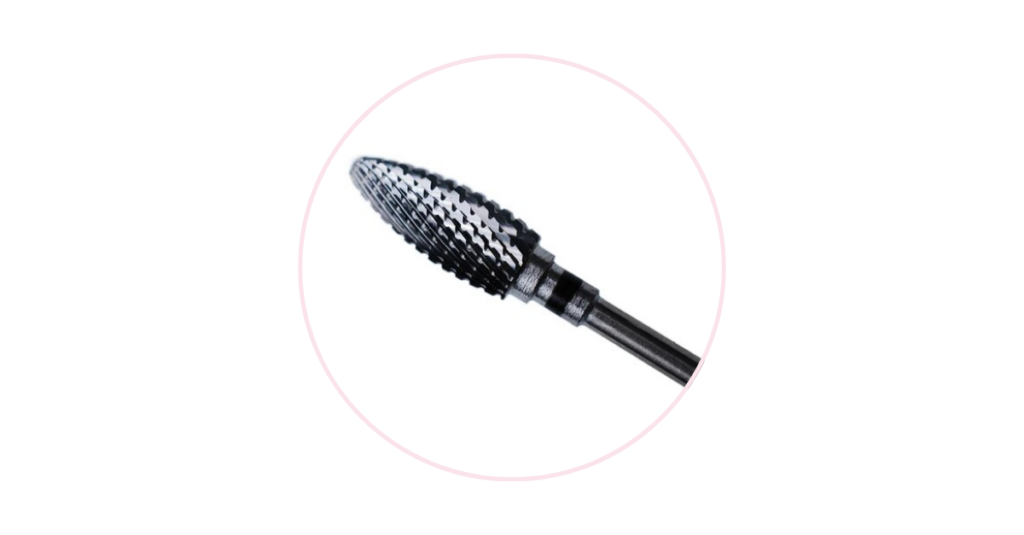
Think of titanium as the superhero of coatings. Its primary power?
Boosting the hardness of the drill bit, making it a durable contender in the face-off against wear and tear.
Plus, it’s a heat-buster, reducing heat buildup during use, which is key to preventing nail damage.
Carbide Nail Drill Bits
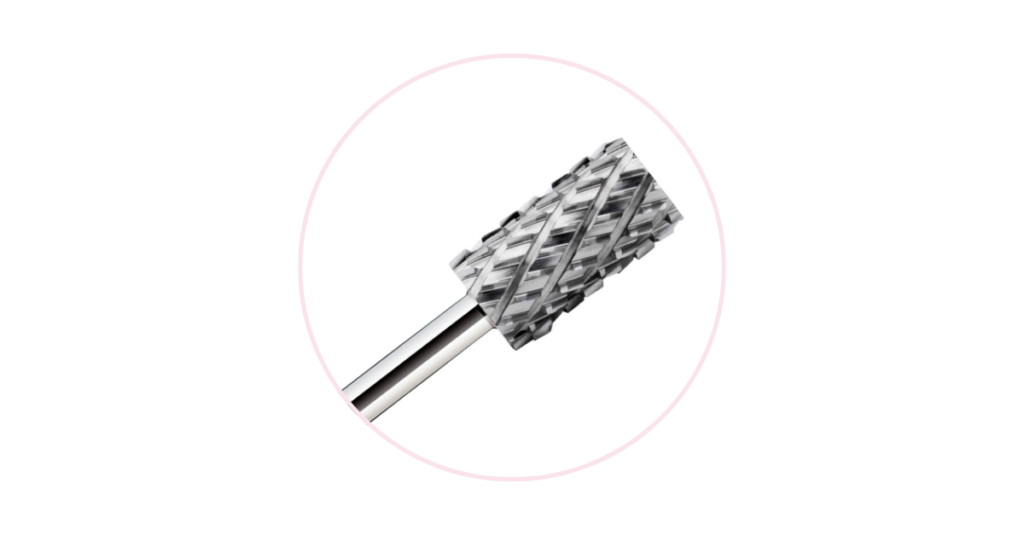
Carbide nail drill bits are described as a great tool for more advanced users; they are gold or silver-coated.
They are used to cut and shape the acrylic nail; they are not to be used on the natural nail.
These also come in extra fine, fine, medium, coarse, and extra coarse.
An extra coarse grit is good for taking off acrylic and gel layers and making nails shorter. A coarse grit is good for filling the sides and shaping both fingers and toes.
Medium grit is good for many things. It can make acrylic nails shorter, create new smile lines, and change the whole nail shape.
Fine grit is best for smoothing and shaping acrylic or gel nails. If there’s extra acrylic you don’t want, this grit can take it off. It’s also good for making the smile line on short acrylic or gel nails.
As most carbide nail bits are square at the tip, their purpose is to refine the surface of the nail.
A tapered version will help you get deeper into the corners and around the sides. The typical size of these nail drill bits comes in 3/32.
Ceramic Bits
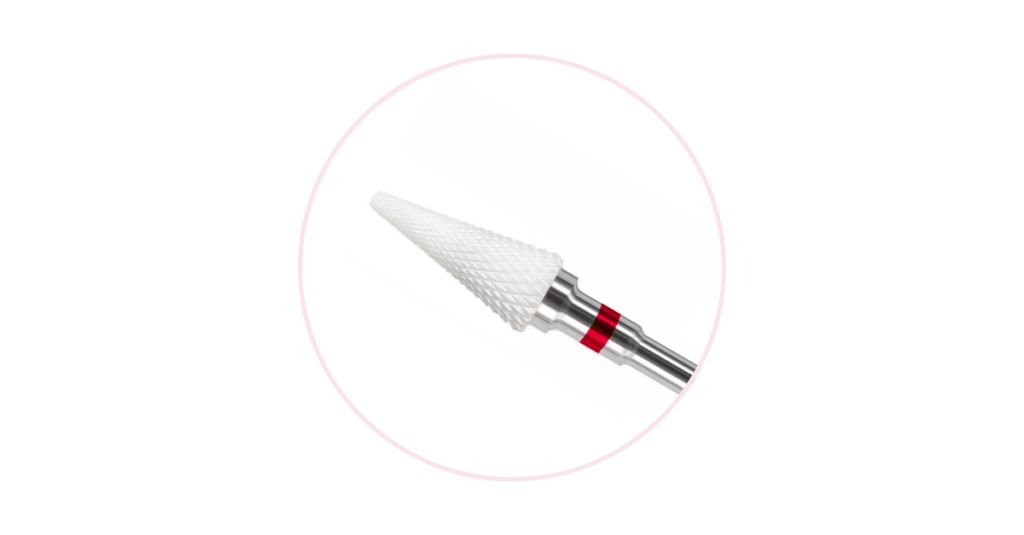
When the pressure from a drill bit leads to heat buildup, discomfort can follow.
These long-lasting bits don’t heat up like their counterparts, providing a more comfortable experience for the client.
Like carbide bits, ceramic bits come in flute-like cuts with varying grits, from fine to coarse. Plus, they’re easy to clean and sterilize, making them a reliable, reusable option.
You can learn more about ceramic nail drill bits in our article here.
Diamond Bits
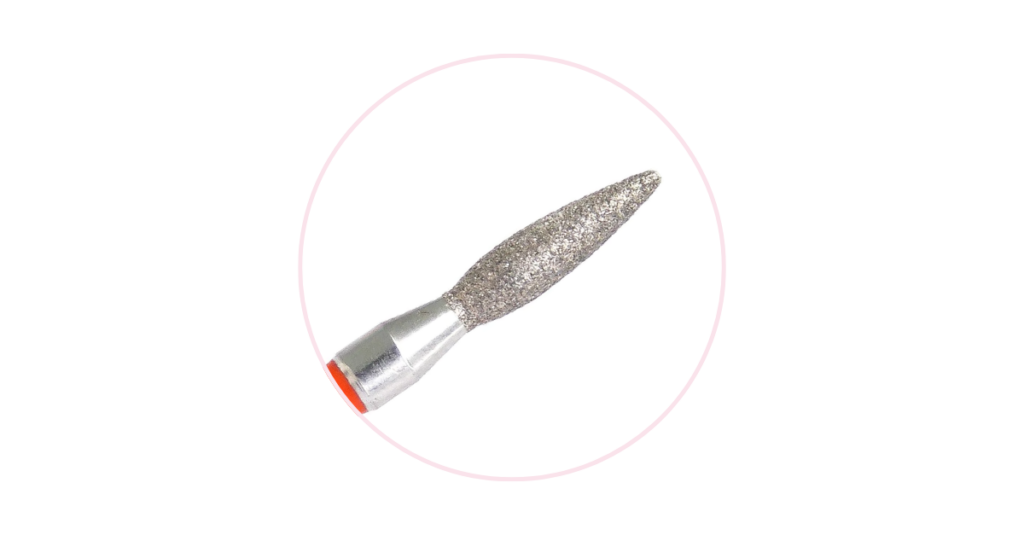
These nail drill bits can be derived from both natural or synthetic means and are the hardest bits available.
They are used to remove the built-up product by scratching it off, but they create more dust and friction compared to the previously mentioned bits, and therefore, more heat. They also won’t rust after being disinfected.
Drill Bit Textures and Grits
The texture and grit of a drill bit dictate its level of aggressiveness and suitability for certain tasks.
But what exactly are nail drill bit grits?
In the world of nail bits, grit refers to the coarseness or fineness of the abrasive surface.
The grit range typically starts from 80 (coarse) and goes up to 1200 (ultra-fine).
Here’s how to choose the right grit for your needs:
- Coarse Grit (80-150): These bits are perfect for removing acrylic or gel extensions, shaping thick nails, and reducing length quickly.
- Medium Grit (180-240): The most versatile grit, medium bits are great for shaping natural nails, removing product buildup, and refining the surface of the nail.
- Fine Grit (320-600): Ideal for smoothing and buffing natural nails, fine bits are also used for removing ridges and imperfections.
- Extra Fine Grit (800-1200): These ultra-fine bits are perfect for buffing and shining the nail surface, creating a glossy finish.
Smooth Top
Smooth top drill bits have a flat surface and are perfect for smoothing out ridges and imperfections on the nail surface.
Barrel/Cylinder Bit
Barrel bits have a cylindrical shape and are great for removing product and shaping the nail. They come in various sizes, so you can choose the one that fits your needs.
UNC
UNC stands for “under the nail cleaner”, it is thin and tapered and allows access to under the acrylic nail.
You can use this bit to gently bevel the undersides without clipping the fingertip.
Some nail technicians use it to puncture holes in the acrylic nail to add rings and charms.
Ball Top Shape
Ball top bits are ideal for creating a smooth, rounded edge on the nail.
They can also be used for removing products and shaping the nail surface.
Cone Bit
Cone bits have a conical shape and are perfect for removing products from tight corners and hard-to-reach areas.
Choosing the Right Nail Bit
The size of your nails determines whether to use a small or large barrel nail bit.
For short nails, a curved bit with a smaller diameter is ideal as it can reach the corners of your nails with ease.
Long nails, however, require a straight bit with a larger diameter to file the nails evenly.
Grinding and Smoothing Nails
The milling cutter bit is your go-to tool for processing gel nails, acrylics, and natural nails. Diamond nail bits are also useful for grinding or smoothing out any nail art.
Gel Removal and Cuticle Preparation Bits
The T-Rex Bit, with its firm and efficient teeth, is excellent for removing gel polish, gel extensions, hard gel, and acrylic nails.
Its rounded top prevents any cuts to the cuticles.
The Violet Safety Bit is another excellent option. Its smooth, large top protects the cuticle from cuts.
It is also great for refining the cuticle area and removing gel polish, with minimal damage to natural nails.
Bits for Removing Calluses
The Diamond Pedicure Cone Bit gently removes rough skin from the foot and reduces cracks and calluses on heels.
The Narrow Cone Bit reaches tighter places like the nails and corners efficiently, preventing ingrown toenails.
Cleaning Nail Bits
Cleaning your drill bits is straightforward. Mix a water-detergent solution or acetone and let the bits soak in it for about 10 minutes.
Once dry, store them away. If you want to clean your drill bits, we have this really detailed article about how to clean them here.
Understanding Nail Drill Bit Color Codes
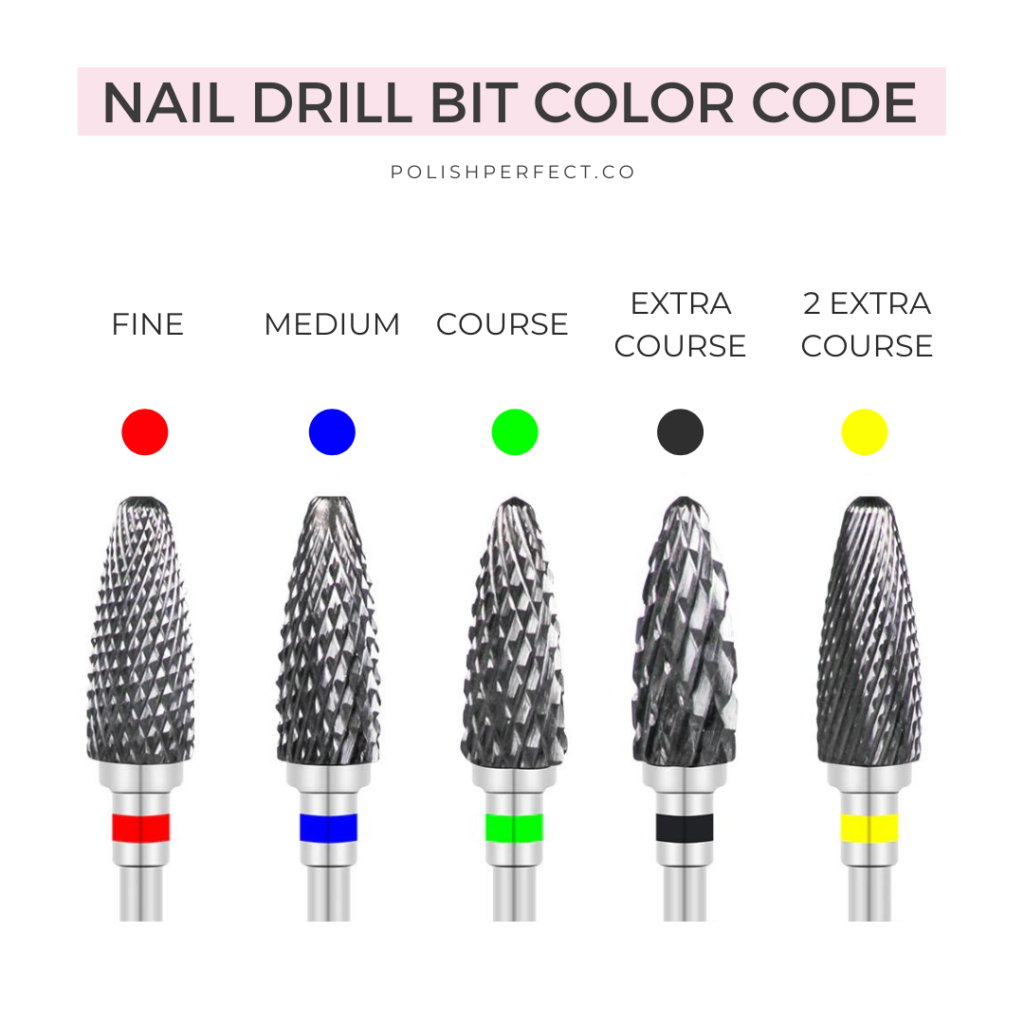
Nail drill bit color coding indicates the bit size.
The primary color represents the largest bit size, while the secondary color indicates the next smallest bit size.
For instance, a black drill bit with a yellow band represents a 7/32″ drill bit, while a white drill bit with a blue band represents a 1/4″ drill bit.
Nail Drill Bit Grit Guide
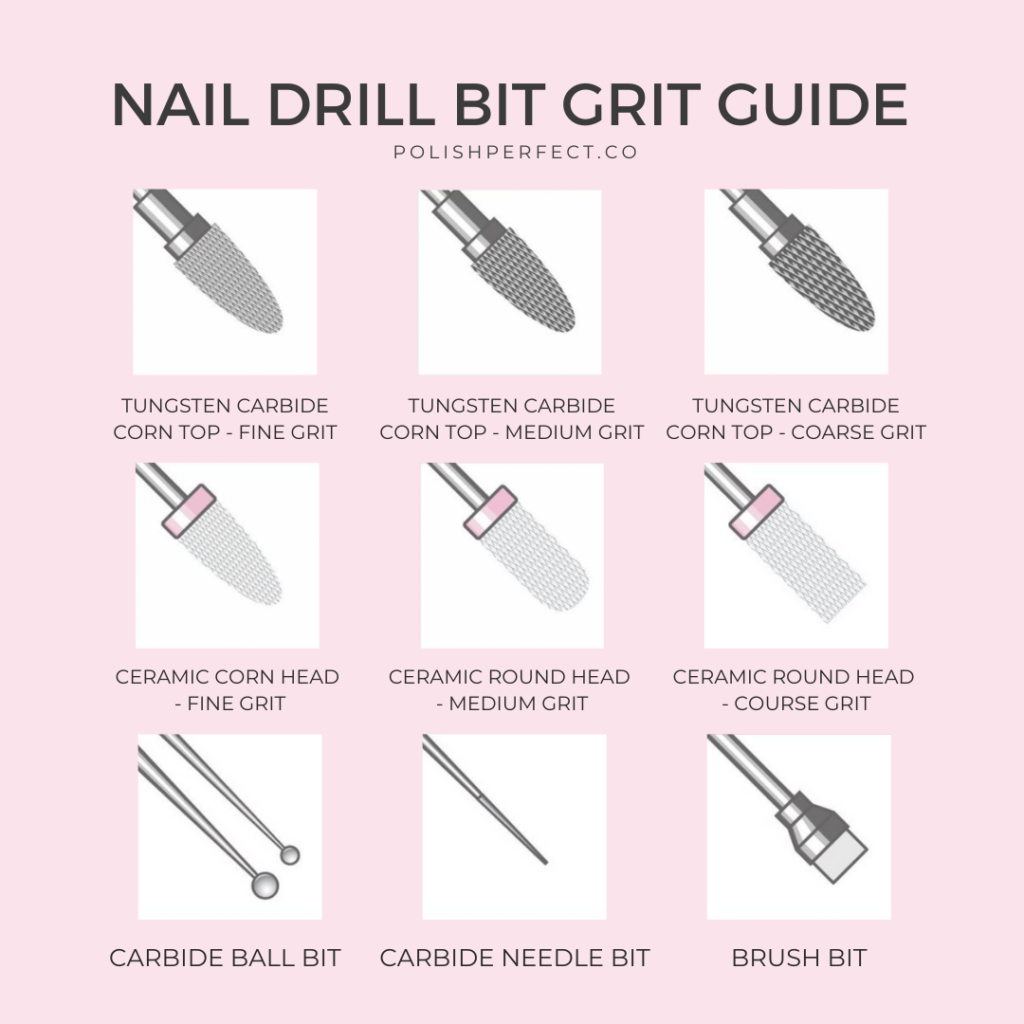
The nail drill bit grit guide helps you determine the best grit size for your machine. Lower numbers on the chart indicate a more coarse (rough) nail drill bit.
Nail Drill Bit Size Guide
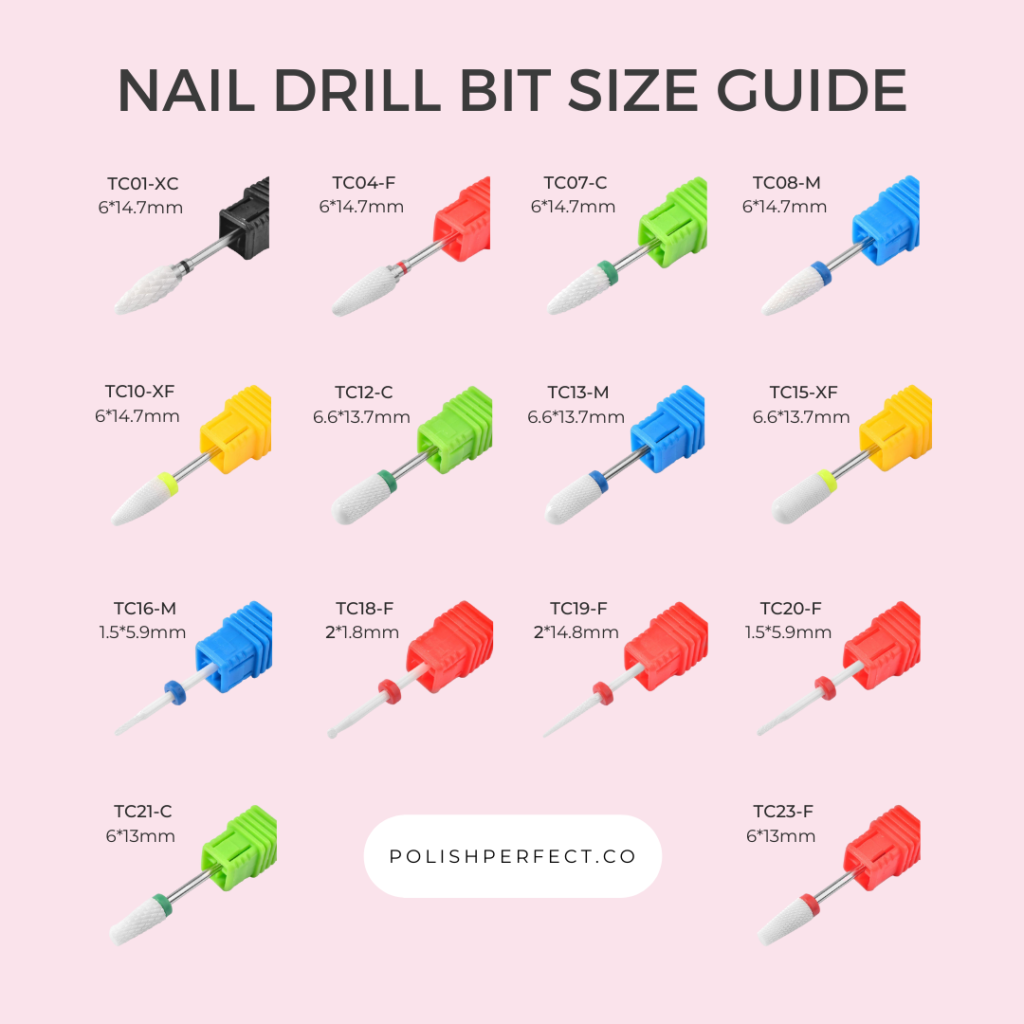
The size of a nail drill bit is determined by the width of the shank, not its point. Measure the width of the bottom to understand the drill bit size.
Compatibility of Nail Drill Bits with Drills
Not all nail drill bits fit all drills. A nail drill bit with a shank of 3/32 inches diameter only works with nail drills that accept that size.
Similarly, 1/8 inches diameter nail bit shanks only work with nail drills of specifically the same size, which is 18 inches.
So how do you connect the bit to the drill?
Connecting the Drill Bit to the Nail Drill
Let’s talk about how to connect your drill bit to your nail drill.
It’s a simple process, but it’s important to do it right to ensure a secure and stable connection.
- Start by ensuring that your nail drill is turned off and unplugged. Safety first, my friends!
- Look for the chuck on your nail drill.
This is the part that holds the drill bit in place. It usually looks like a small, metal cylinder.
- Insert the shank of the drill bit into the chuck.
The shank is the part of the nail drill bit that goes into the chuck. Make sure it’s inserted all the way in.
- Tighten the chuck to secure the drill bit.
Most nail drills have a tightening mechanism, like a lever or a twist lock.
Use it to tighten the chuck and hold the drill bit in place.
And voila! You’re now ready to start using your drill bit. Easy peasy, right?
Check it Out
One of the best ways to fully understand what nail drill bits are used for what is to see each of the drill bits explained.
The following video is a short presentation that clearly explains some of the basic drill bits you may want for your collection.
Drill Bit Lifespan and Recommendations
On average, a high-quality nail drill bit lasts anywhere from 3 to 6 months with regular use.
However, it’s crucial to keep an eye on your drill bits and replace them as needed.
Always invest in nail drill bits made from high-quality materials like carbide or diamond for durability and performance.
What To Remember
Learning all the different types of nail drill bits and their uses can take time.
In fact, knowing specifically the work you want to complete will help you determine which bits you need to have in your collection.
Remember that you can purchase any nail drill bit on Amazon, but there is no rush to collect all the different bits out there until you have had some time to practice first and gain some experience.
Final Thoughts
Nail techs, you’re all set to expand your collection with various materials and techniques.
Take your time to practice before collecting all the nail drill bits.
Remember, proper care matters for top-notch nail services.
Share your thoughts or questions below, and if you found this article helpful, spread the word among your friends!

